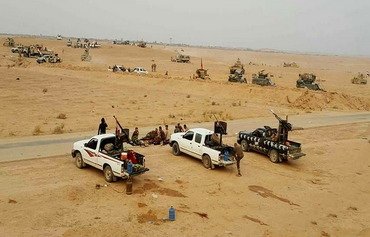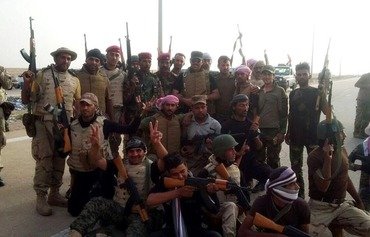Joint Iraqi forces have retaken control of the upper Euphrates area that lies between the cities of Haditha and Anah in Anbar province, from the "Islamic State of Iraq and the Levant" (ISIL), officials tell Diyaruna.
Iraqi forces on January 5th launched an offensive aimed at retaking towns under ISIL control in western areas near the border with Syria .
The operation, led by al-Jazeera and al-Badiya Operations Command, the army's 7th division, police and fighters from local tribes, with aerial backing from the international coalition, is targeting the westernmost Iraqi towns along the Euphrates Valley.
After liberating Heet and Kubaysa last year and securing the Haditha–Baiji road in October, Iraqi forces launched a military operation to seize control of the upper Euphrates basin, which stretches from the north-west of Haditha to the outskirts of Anah, said al-Jazeera and al-Badiya commander Maj. Gen. Qassim al-Mohammedi.
"The goal was to fend the threat of terrorism off Haditha and other liberated cities, boost our units’ advance and deployment deeper into enemy territory, and prepare for a larger offensive to drive ISIL out of Anah, Rawa and al-Qaim and declare Anbar fully liberated," he told Diyaruna.
The operation has "achieved its designated objectives and ISIL no longer has a presence in the area", said Anbar operations commander Maj. Gen. Ismail al-Mahalawi.
"We have recaptured two important villages, al-Sakra and al-Zawiya,", he said, adding that 27 ISIL elements were killed in the offensive, some of whom were wearing explosive belts.
Iraqi forces have searched the liberated area for any remaining ISIL hideouts and have set up defence lines around it, he said. Engineering teams also have defused around 300 explosives inside and outside al-Sakra and al-Zawiya.
Military commands are drawing up strategies to advance towards the areas still occupied by the terrorists, most notably al-Qaim, al-Mahalawi said.
ISIL considers al-Qaim as its second most important stronghold in Iraq after Mosul, due to its strategic location on the border with Syria and the presence of the group's leaders and command and control headquarters there, he added.
Tribes give boost to Iraqi forces
"We will make every effort to drive the terrorists from their last strongholds in Anbar, shut the border in their face, reopen police stations and border guard positions, and activate fixed and foot patrols," he said.
Al-Mahalawi also commanded the tribes for the support they are providing Iraqi forces.
"The participation of local volunteers [in the battle] has strengthened our advance and provided a safe environment for our troops in the areas being liberated," he said.
The battle to clear the Euphrates basin involved hundreds of local fighters from the various western Anbar tribes, such as al-Jughaifa, al-Karabla, al-Ani, al-Obaid and Albu Mahl, Anbar provincial council security committee member Rajeh Barakat al-Aifan told Diyaruna.
"When the operation started, many people from Ramadi and Fallujah submitted to the local government requests to volunteer and take part in the fighting," he told Diyaruna.
Their participation in the battle and in maintaining security in the liberated areas reflects "the popular solidarity and unity against terrorism", al-Aifan said.
"Tribal members today enjoy combat skills and experience and are well trained to launch any new military campaign against ISIL to end its presence in their province," said tribal leader in western Anbar Sheikh Ghazi Nafe al-Jughaifi.
"The battle for the upper Euphrates area was carried out with a high level of co-ordination between the military units and the tribes," he told Diyaruna.
"The co-operation and the drive that all fighters demonstrated have had a major impact on achieving a swift and overwhelming victory over the terrorists," he said.
Iraqi forces suffered no human losses in the offensive, al-Jughaifi said, adding that they are now in control of the area stretching along the Euphrates river and the Haditha Dam lake, all the way to the outskirts of Anah.

![Iraqi forces enter newly liberated areas in western Anbar. Joint forces have launched an operation on January 5th to retake the remaining areas of Anbar still under 'Islamic State of Iraq and the Levant' control. [Photo courtesy of the Iraqi Ministry of Defence]](/cnmi_di/images/2017/01/23/7082-Iraq-Anbar-Euphrates-600_384.jpg)





